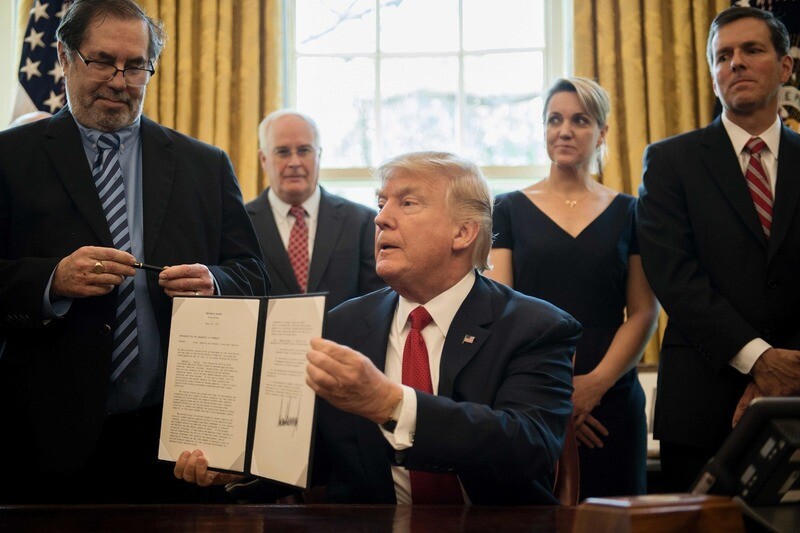hankyoreh
Links to other country sites 다른 나라 사이트 링크
Possible US import restriction sounds alarm for South Korean steel producers

US President Donald Trump signed an executive order at the White House on Apr. 20 for a probe into whether the US needs to restrict imports of steel for national security purposes.
The US’s growing import regulation barriers to protect its own industry are now triggering alarm for South Korea’s steel producers.
The executive order was based on Article 232 of the 1965 Trade Expansion Act, which permits emergency trade measures for national security reasons. The article allows for discussion of preemptive measures in cases where damage to the US industry due to competition with foreign companies is deemed to pose a risk to national security. For example, imported steel alloy products are seen as potentially affecting national security due to their potential use in making warships and tank plating.
“Dumping is a tremendous problem in this country,” Trump said at a press conference just after the signing.
“Maintaining the production of American steel is extremely important to our national security and our defense industrial base,” he added.
Steel industries around the world are objecting to the measure, calling it “typical big power logic” to link steel imports to security issues.
“The US is citing security arguments in an effort to protect its own industry. There are serious grounds here for complaint to the World Trade Organization (WTO),” said one South Korean steel industry source.
Barriers to protect the US steel industry have been growing since before Trump took office, due to anti-dumping suit filed by US businesses. While Trump said the measure had “nothing to do with China,” China is ultimately the clear target of the regulations. US steel companies have complained in the past that the glut of Chinese steel was hurting their own competitiveness. The flood of cheap Chinese steel on the global market since the 2008 financial crisis has only intensified the US trend toward trade protections.
The problem is that while China may have been the chief factor behind the increasing import barriers, South Korean businesses are not exempt from the anti-dumping and countervailing duty measures.
“As the US began using pressure tactics to rectify its trade imbalance with China, there were fears other exporters could suffer in turn,” said Shim Sang-hyeong, a senior research fellow at the POSCO Research Institute. “Those fears are now coming to pass.”
The Wall Street Journal wrote on Apr. 22 that the Trump administration was reviving the 55-year-old law to introduce new trade barriers against steel imports for national security reasons. The article also noted that the US had not invoked the Trade Expansion Act for unilateral measures since the WTO’s founding in 1995. The US Commerce Department launched an anti-dumping probe on Apr. 18 on steel wire exported by ten countries, including South Korea.
In the past, South Korean companies like POSCO and Hyundai Steel have exported cold rolled steel and hot rolled steel to the US free of duties. Individual companies have worked to come up with response measures, but no obvious solution is in sight for the US’s unbending trade barriers.
“The US accounts for 13% of total steel experts, which isn’t that much,” said an industry source.
“The bigger worry is whether this power logic-based import regulation approach the US is going to start spreading to other countries.”
By Hong Dae-seon, staff reporter
Please direct questions or comments to [english@hani.co.kr]

Editorial・opinion
![[Column] Has Korea, too, crossed the Rubicon on China? [Column] Has Korea, too, crossed the Rubicon on China?](https://flexible.img.hani.co.kr/flexible/normal/500/300/imgdb/original/2024/0419/9317135153409185.jpg) [Column] Has Korea, too, crossed the Rubicon on China?
[Column] Has Korea, too, crossed the Rubicon on China?![[Correspondent’s column] In Japan’s alliance with US, echoes of its past alliances with UK [Correspondent’s column] In Japan’s alliance with US, echoes of its past alliances with UK](https://flexible.img.hani.co.kr/flexible/normal/500/300/imgdb/original/2024/0419/2317135166563519.jpg) [Correspondent’s column] In Japan’s alliance with US, echoes of its past alliances with UK
[Correspondent’s column] In Japan’s alliance with US, echoes of its past alliances with UK- [Editorial] Does Yoon think the Korean public is wrong?
- [Editorial] As it bolsters its alliance with US, Japan must be accountable for past
- [Guest essay] Amending the Constitution is Yoon’s key to leaving office in public’s good graces
- [Editorial] 10 years on, lessons of Sewol tragedy must never be forgotten
- [Column] A death blow to Korea’s prosecutor politics
- [Correspondent’s column] The US and the end of Japanese pacifism
- [Guest essay] How Korea turned its trainee doctors into monsters
- [Guest essay] As someone who helped forge Seoul-Moscow ties, their status today troubles me
Most viewed articles
- 1[Column] The clock is ticking for Korea’s first lady
- 2Hong Se-hwa, voice for tolerance whose memoir of exile touched a chord, dies at 76
- 3[Column] Has Korea, too, crossed the Rubicon on China?
- 4After 2 months of delayed, denied medical care, Koreans worry worst may be yet to come
- 5[Correspondent’s column] In Japan’s alliance with US, echoes of its past alliances with UK
- 6US overtakes China as Korea’s top export market, prompting trade sanction jitters
- 7All eyes on Xiaomi after it pulls off EV that Apple couldn’t
- 8[Photo] Smile ambassador, you’re on camera
- 9Samsung barricades office as unionized workers strike for better conditions
- 10S. Korea “monitoring developments” after report of secret Chinese police station in Seoul